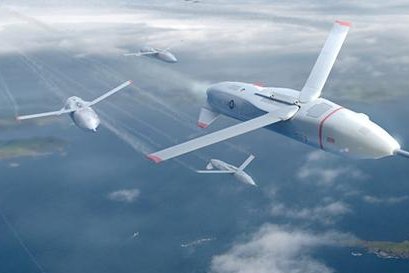Britain's government has awarded a $3.3 million contract a consortium to develop drone swarm technology, which is similar to the U.S. Defense Advanced Research Projects Agency's Gremlins program. Artist rendering courtesy
DARPA
April 1 (UPI) -- Britain's government has awarded a $3.3 million contract for a consortium to develop drone swarm technology for the military as part of the Many Drones Make Light Work project.
The swarms are planned to operate alongside Britain's F-35 and Typhoon combat aircraft, Britain's Defense Ministry announced Thursday. Funding comes from the Defense and Security Accelerator.
The consortium is led by Blue Bear Systems Research, a world leader in autonomous system solutions. IQHQ, Plextek, Airbus and the University of Durham are also part of the contracted team.
The 18-month "integration concept evaluation" phase will culminate in live flight demonstrations to the military. Twenty unmanned aerial systems will be produced into the final stage of development and will ultimately be managed by the Defense Science and Technology Laboratory.
"The MOD continues to invest in pioneering technology that enhances capability, reduces risk to personnel and enables us to better perform our tasks," Defense Minister Stuart Andrew said in a news release. "Drone swarm technology can revolutionize how we conduct intelligence gathering, humanitarian aid, disposal of explosives and supply our troops on the battlefield.
Currently, operational systems require one or more operators to pilot the aircraft or to closely manage the flight mission.
Swam systems operate collaboratively to achieve a common goal, which the government said is a "great benefit to defense."
A swarm provides increased efficiency, lower costs and greater resilience in situational awareness, medical assistance, logistics resupply, explosive ordnance detection and disposal, and confusion and deception.
"The ability to deploy a swarm of low-cost autonomous systems delivers a new paradigm for battlefield operations," Blue Bear Systems Managing Director Ian Williams-Wynn said. "During this project, we will deploy next-generation autonomy, machine learning, and AI to reduce the number of operators required, the time it takes to train them, and the cognitive burden on any operator during active operations."
Britain's defense ministry sees the swarm system as one possible solution to a multiple domain requirement in which robotic solutions utilize fewer people and equipment. That includes removing the operator from potentially harmful situations.
"The Phase 3 competition requirements were deliberately very challenging, as we wanted to drive rapid innovation and encourage imaginative solutions," Antony Grabham, the Defense Science and Technology Laboratory project technical lead, said. "The winning consortium really highlights the best of U.K. Industry, showcasing how our world-leading small and medium enterprise companies can be harnessed to deliver a transformation in military capability.
In February, the British government authorized $40.7 million for new mini-drones from the $210 million Transformation Fund.
The mini-drones will provide soldiers with an "eye-in-the-sky," the Ministry of Defense said in a news release. The Times reported that the drones will be "smaller than a hand" and weigh less than 200 grams. Some funding will be used to convert existing fighting vehicles into remote-controlled driverless systems.
The Transformation Fund is part of its 2018 Modernizing Defense Program, including two new Littoral strike ships.
In February, Defense Secretary Gavin Williams said Brexit presents the "greatest opportunity in 50 years to redefine our role" and challenge those who "flout" the "rules-based international order."
The U.S. Defense Advanced Research Project Agency has launched the Gremlins program, named for the imaginary, mischievous imps that became the good luck charms of many British pilots during World War II. Groups of drones would be launched from existing large aircraft such as bombers or transport aircraft as well as from fighters and other small, fixed-wing platforms. C-130 transport aircraft would retrieve them in the air and carry them home for their next use within 24 hours.
General Atomics Aeronautical Systems and Dynetics are designing prototypes.















